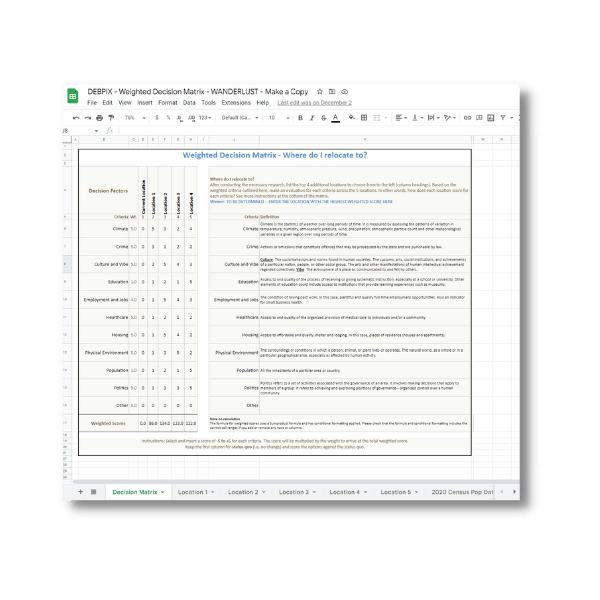Wanting to constantly move and experience new places can be an affliction; it is also the initiator of great adventures
The first indication I was afflicted with wanderlust was at the age of 20 when I moved away from my hometown and relocated to a major southern city for a few years. It was the first time I was exposed to a diverse population. It was the first time I could hear the music genres I most enjoyed over the radio. It was the first real opportunity to connect with others who enjoyed many of the same interests. It was the first time I could enjoy winters that weren’t brutally cold. It was refreshing. Short-lived, though. Within a few short years, I moved back to my home state in the northeast to be near family again.
After a few years, the restlessness in me was all-consuming. I knew I couldn’t continue living there — I had to get out and experience other places. Before I could go anywhere, though, I needed to do my research.
At the time (early-mid 90s), the internet was still very much in its infancy in terms of available information I could potentially use for research. I did, however, find a book called the Places Rated Almanac that proved instrumental in my research of other places. I read it thoroughly, took the quiz, and determined that the best place for me was a spot between Baltimore, Maryland, and Washington, DC. Within a short period of time, I did actually relocate to that area. Due to a variety of factors, I have moved around a lot since but reflecting back, that area is still my favorite among all of the places I’ve lived.
After 20 years of moving up and down the east coast and living in 5 states, I am back in my home state for a few years to be near my aging parents. Ideally, I need to get to a point where I split my time here near them and my time in the south near my daughter and grandchildren. Working on that.
Over the years I have often wondered if there were a lot of people like me. I really wanted to engage with those who were but never acted on their impulses to travel and move around. I wanted to understand their strategies for ignoring or coping and if there was any regret for not giving in to those impulses.
For those who are beyond curious and find themselves determined to engage in such freedom and adventure, I’ve wanted to share what I’ve learned about the process of discovering which places are most suitable and the logistics of relocating to perhaps help them in their journey.
The internet has come a long way since I did my own initial research — there is so much data available to us now. For a long time, I’ve wanted to build a comprehensive set of tools that will better assist with this type of research and decision-making. Below is just a start . . . and I’m more than willing to share.
Determine your criteria and prioritize
There are many factors to consider when deciding on a city or state to live in. Here are a few things you might want to consider:
- Cost of living: Different cities and states have different costs of living. If you’re on a budget, you’ll want to consider factors like housing costs, grocery prices, prices of other major necessities, and taxes.
- Employment opportunities: Consider the types of jobs and industries that are available in the area and whether they align with your career goals.
- Climate and/or weather: Think about whether you prefer hot or cold weather, and whether you’re comfortable with extreme temperatures or weather events like hurricanes or tornadoes.
- Culture and community: Different cities and states have different cultures and communities. Consider what type of community you want to be a part of and whether the city or state you’re considering aligns with your values and interests. Consider the types of activities and events that are available and whether or not they align with your interests and hobbies.
- Access to amenities and services: Consider what types of amenities and services are important to you, such as schools, hospitals, public transportation, parks, restaurants, shopping, cultural events, and outdoor recreation, and whether the cities or states you’re considering have adequate access to these things.
- Proximity to family and friends: If you have close relationships with family and friends, you may want to consider living in a location that’s closer to them.
- Safety: Look into crime rates and safety ratings in the city or state you’re considering.
Ultimately, the decision of where to live will depend on your personal preferences and circumstances. It might be helpful to make a list of your criteria, give weight to each, and consider how different cities and states measure up in those areas. To help you with this, I’ve created a free tool I call my Wanderlust Weighted Decision Matrix. Read on to learn more about it and how to get your free copy.
Download my helpful free Wanderlust Weighted Decision Matrix
When using the tool, the key is to:
- Determine and give weight to the areas of life that are most important to you — I’ve already compiled examples that you may alter for your needs.
- Compile and analyze any available data (I included some example population data in the tool as a starting point) and recommendations from other sources to obtain facts and other information about the locations you are exploring. I have included a tab for each location; feel free to use them for your notes.
- Organize all of the information you have compiled in a meaningful way so that you can flush out the optimal location(s) within the weighted decision matrix. Instructions are included.

Final tip: It may also be helpful to visit the cities or states you’re considering and spend some time there to get a feel for the place before making a decision.
Good luck and I hope you find the place(s) that are just right for you!


